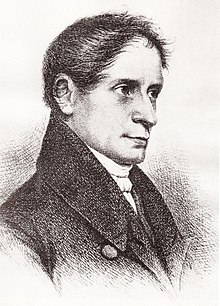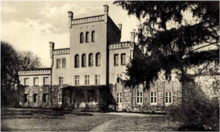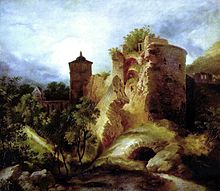
Back Joseph von Eichendorff ALS جوزيف فرايهر فون أيشندورف Arabic چوزيف فرايهر فون ايشندورف ARZ Yozef fon Eyxendorf Azerbaijani یوزف فرایهر فن آیشندرف AZB Іозеф фон Айхендорф Byelorussian Ёзэф фон Айхэндорф BE-X-OLD Йозеф фон Айхендорф Bulgarian Joseph von Eichendorff Breton Joseph von Eichendorff Catalan
Joseph Freiherr von Eichendorff | |
|---|---|
 | |
| Born | Joseph Karl Benedikt Freiherr (Baron) von Eichendorff 10 March 1788 Schloss Lubowitz (Polish: Pałac Eichendorffów) near Ratibor, Prussian Silesia, Kingdom of Prussia |
| Died | 26 November 1857 (aged 69) Neisse (Polish: Nysa), Prussian Silesia, Kingdom of Prussia |
| Occupation | Novelist, poet, essayist |
| Education | Heidelberg University |
| Period | 19th century |
| Genre | Novellas, fairy tales, poetry |
| Literary movement | Romanticism |
| Notable works | Memoirs of a Good-for-Nothing, The Marble Statue |
| Signature | |






Joseph Freiherr von Eichendorff (10 March 1788 – 26 November 1857) was a German poet, novelist, playwright, literary critic, translator, and anthologist.[1] Eichendorff was one of the major writers and critics of Romanticism.[2] Ever since their publication and up to the present day, some of his works have been very popular in German-speaking Europe.[3]
Eichendorff first became famous for his 1826 novella Aus dem Leben eines Taugenichts (freely translated: Memoirs of a Good-for-Nothing)[4] and his poems.[5] The Memoirs of a Good-for-Nothing is a typical Romantic novella whose main themes are wanderlust and love. The protagonist, the son of a miller, rejects his father's trade and becomes a gardener at a Viennese palace where he subsequently falls in love with the local duke's daughter. As, with his lowly status, she is unattainable for him, he escapes to Italy – only to return and learn that she is the duke's adopted daughter, and thus within his social reach.[1] With its combination of dream world and realism, Memoirs of a Good-for-Nothing is considered to be a high point of Romantic fiction. One critic stated that Eichendorff's Good-for-Nothing is the "personification of love of nature and an obsession with hiking."[6] Thomas Mann called Eichendorff's Good-for-Nothing a combination of "the purity of the folk song and the fairy tale."[7]
Many of Eichendorff's poems were first published as integral parts of his novellas and stories, where they are often performed in song by one of the protagonists.[8] The novella Good-for-Nothing alone contains 54 poems.[9]
- ^ a b "Joseph, baron von Eichendorff – German writer".
- ^ Cf. J. A. Cuddon: The Penguin Dictionary of Literary Terms and Literary Theory, revised by C. E. Preston. London 1999, p. 770.
- ^ Cf. Peter Horst Neumann: Eichendorff im technischen Zeitalter. Zu seinem 200. Geburtstag. In: Die Zeit/Zeitmagazin 11. März 1988 http://www.zeit.de/1988/11/eichendorff-im-technischen-zeitalter
- ^ Joseph Freiherr von Eichendorff: Memoirs of a Good-for-Nothing. Ungar, New York 1955. ISBN 0804461341
- ^ Cf. Jürgen Thym: 100 Years Of Eichendorff Songs. Recent Researches in the Music of the Nineteenth and Early Twentieth Centuries, vol. V; A-R Editions, Inc. Madison 1983, p. viii. ISBN 0-89579-173-0
- ^ Cf. Ernst Alker: Die deutsche Literatur im 19. Jahrhundert (1832–1914), 2nd ed., Kröners Taschenbuch vol. 339, Stuttgart 1962, p. 27.
- ^ Hanjo Kesting: Eichendorff und seine Gesellen. Die Wiederkehr der Romantik. http://www.frankfurter-hefte.de/upload/Archiv/2008/Heft_01-02/PDF/080102_86_89.pdf
- ^ Cf. Katja Löhr: Sehnsucht als poetologisches Prinzip bei Joseph von Eichendorff. Epistemata, Würzburger Wissenschaftliche Schriften, Reihe Literaturwissenschaft vol.248, Würzburg 2003, p.12-13. ISBN 3-8260-2536-9
- ^ Cf. Wolfdietrich Rasch (Ed.): Joseph von Eichendorff. Sämtliche Gedichte. Deutscher Taschenbuch Verlag München, 1975, p.502/503. ISBN 3-446-11427-0